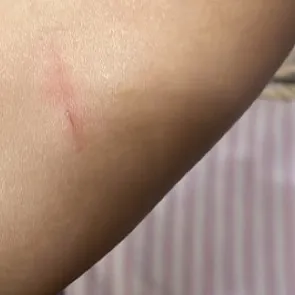![POOJA KOTHARI profile image of POOJA KOTHARI]() POOJA KOTHARIMom of a 8 yr 10 m old boy1 Year ago
POOJA KOTHARIMom of a 8 yr 10 m old boy1 Year agoA. It’s understandable to feel frustrated in this situation. Here’s how to address both the immediate issue with the scratch and the ongoing concern with your in-laws:
### **Immediate Care for the Scratch:**
1. **Clean the Wound:**
- **Wash Gently**: Clean the scratch gently with mild soap and water to prevent infection.
- **Apply an Antiseptic**: Use an antiseptic ointment if needed.
2. **Monitor for Infection:**
- **Watch for Signs**: Look for redness, swelling, or discharge. If any of these occur, consult a pediatrician.
3. **Consult a Doctor:**
- **Seek Medical Advice**: If the scratch is deep, shows signs of infection, or if you're concerned about potential diseases from the kitten, seek medical advice promptly.
### **Addressing the Issue with Your In-Laws:**
1. **Communicate Your Concerns:**
- **Express Clearly**: Have a calm, clear discussion with your in-laws about your concerns regarding the safety and well-being of your child. Explain why you prefer to avoid certain interactions, such as playing with pets that might scratch.
2. **Set Boundaries:**
- **Be Firm**: Politely but firmly set boundaries regarding your child’s interactions with animals. Emphasize the importance of following your guidelines for your child’s safety.
3. **Provide Alternatives:**
- **Suggest Activities**: Offer alternative ways for your child to engage with family members that don’t involve potential risks.
4. **Seek Support:**
- **Involve a Mediator**: If direct communication is challenging, consider involving a neutral third party, such as a family counselor or mediator, to help address and resolve the issue.
5. **Ensure Consistent Safety Measures:**
- **Supervise Interactions**: When pets are involved, supervise all interactions closely to ensure the safety of your child.
Maintaining open communication and setting clear expectations can help manage these situations and ensure your child’s safety and well-being.





.svg)
.svg)
.png)



Post Answer